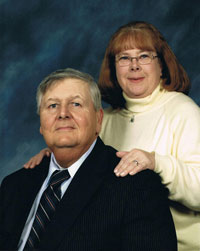Throat Cancer Survivor
Keep moving toward the finish line
 By keeping an open dialogue with his doctors, Drake Ranabargar discovered and combated his Stage IV throat cancer.
By keeping an open dialogue with his doctors, Drake Ranabargar discovered and combated his Stage IV throat cancer.
A few years ago, fall was changing to winter as it always does, and the weather was getting colder. I was having some of the usual symptoms of sinus drainage that always seem to strike around this time of year. But when it started irritating my throat, my wife, who is a nurse, urged me to go to the doctor to get something to dry it up. About a month or so later, I gave in and went to see my primary-care physician, who initially prescribed an antihistamine. After my symptoms didn’t improve over the next few days, the doctor then did a chest X-ray. Even though my lungs looked fine, he told me to try an inhaler to help reduce any irritation or swelling. My condition still didn’t improve, so on my third visit to the doctor, my wife came with me.
At this third appointment my wife insisted on further diagnostic testing, so my doctor ordered a barium swallow. I sipped the barium while the radiologist watched the monitor. There were two visible streams of fluid going down my throat instead of the usual one, so he determined that there indeed was an abnormality in my throat.
The next week I saw an ear, nose and throat (ENT) doctor who found a tumor in my throat during the exam. He ordered a biopsy, and the results came back malignant. I was diagnosed with Stage IV squamous cell carcinoma of the throat.
I was surprised to hear the diagnosis, but after the initial shock I immediately began asking questions about what to do from here. The ENT referred me to an oncologist, who prescribed two rounds of chemotherapy. The treatment had little effect on my tumor, so I found a new oncologist based on the recommendations of a few people I knew who had previously been treated for throat cancer.
During my first visit, this new doctor told me that the specific chemotherapy drug I had been taking was no longer the standard of care and instead recommended surgery followed by treatment with a different chemotherapy drug and radiation therapy. In his opinion, it was the treatment option that would provide me with the most desirable result.
I had a total laryngectomy, and the surgeon removed my entire voice box along with peripheral tissues, part of my tongue, some nearby lymph nodes and several salivary glands. That was followed by six rounds of full-strength chemotherapy and two rounds of half-strength chemotherapy, as well as 36 rounds of radiation therapy. My body handled the treatments extremely well, and while I did experience the normal side effects that come with surgery, chemotherapy and radiation therapy, I did not experience anything unexpected.
I decided from day one that although I didn’t know whether my cancer would win this battle, I did know I wasn’t going to let it without putting up a fight. I did exactly what my doctors told me to do and I was never bashful about asking questions.
Today I’m doing better than I ever expected, and I thank God every day for my wife, family and friends that were with me at every step. They gave me the strength to get me through the healing process and the will to reach the finish line.
Listen to your doctors. Keep asking questions. And you can reach the finish line, too.


